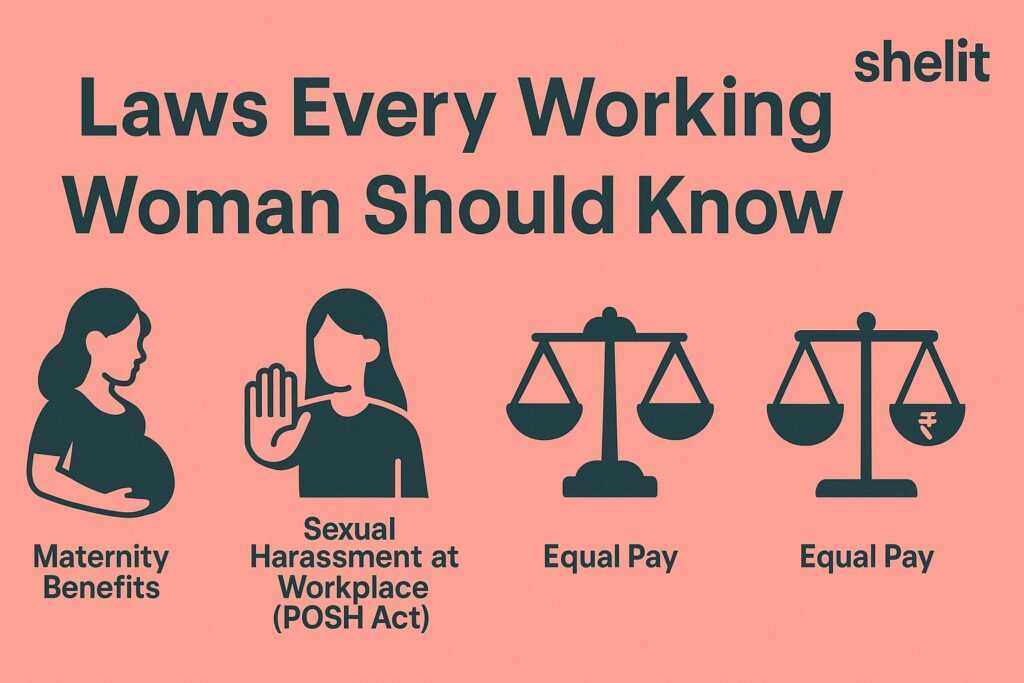In a country that’s rapidly growing in its professional landscape, working women are becoming the backbone of India’s economy. However, with opportunities come challenges—and every woman stepping into a workplace must be aware of her legal rights. Knowledge of the law is not just power; it’s protection. Whether you’re a fresher, a mid-career professional, or a leader—these laws are for you.
Maternity Benefits Act, 1961 (Amended in 2017)
Motherhood should never be a barrier to career growth. The Maternity Benefit Act ensures that working women receive proper care and support before and after childbirth.
Key Provisions:
- Paid maternity leave of 26 weeks for the first two children.
- For the third child, 12 weeks of paid leave.
- 8 weeks leave before delivery and the rest after childbirth.
- Work-from-home option post maternity leave if the nature of work permits.
- Every company with 50+ employees must have a crèche facility.
This law aims to protect women’s employment during the most vulnerable phase of life and promotes a more inclusive and supportive workplace environment.
Sexual Harassment of Women at Workplace (Prevention, Prohibition and Redressal) Act, 2013 – POSH Act
Workplace should be a safe space for all, but sadly, harassment still persists. The POSH Act is a landmark law that empowers women to raise their voices without fear.
Key Provisions:
- Every workplace with 10 or more employees must have an Internal Complaints Committee (ICC).
- A woman can file a complaint within 3 months of the incident.
- The inquiry must be completed within 90 days, and action taken within 10 days after the report.
- Includes verbal, physical, visual, and cyber harassment.
This law protects dignity, safety, and equal opportunity for women and mandates organizations to take preventive and remedial measures.
Equal Remuneration Act, 1976 (Now under Code on Wages, 2019)
Equal work deserves equal pay—regardless of gender. Yet, the gender pay gap remains a real issue.
Key Provisions:
- No employer can pay less wages to women than men for same or similar work.
- No discrimination in recruitment, promotions, or training solely based on gender.
- Employers are prohibited from reducing a woman’s pay only because she is a woman.
This law ensures that financial equality is a right, not a favor.
Factories Act, 1948 – Provision for Women’s Safety and Working Hours
This Act includes specific provisions for the safety and welfare of women working in factories or industries.
Key Provisions:
- No night shifts for women (between 7 PM to 6 AM) unless safety measures are in place.
- Separate washrooms, changing rooms, and restrooms must be provided.
- Maximum 48 hours per week, with no more than 9 hours per day.
It promotes a physically safe and healthy environment for women in industrial sectors.
Employees State Insurance Act, 1948 (ESI Act)
This Act ensures that women employees in low-income jobs (earning under ₹21,000/month) get medical, sickness, and maternity benefits.
Benefits Include:
- Full medical care for insured women and their dependents.
- Maternity benefits for up to 26 weeks.
- Coverage for miscarriage or illness arising out of pregnancy.
The ESI Act is a lifeline for women in unorganised or low-paying jobs, providing them with a safety net.
Right to File an FIR – Indian Penal Code (IPC)
Every woman has the right to file an FIR at any police station—be it for workplace harassment, assault, or any criminal offense.
Important points:
- A woman can file an FIR at any police station, irrespective of jurisdiction.
- In case of sexual crimes, a woman police officer must record the statement.
- Under Section 354, 354A-D, 509 of IPC, various forms of sexual misconduct are punishable.
This right ensures access to justice and must be exercised without fear.
Know Your Rights, Own Your Power
Being a working woman in today’s India is about more than just earning a paycheck—it’s about claiming space, dignity, and freedom. But none of it is truly possible unless we know our rights and exercise them when needed.
Whether you’re stepping into your first job or leading a team, make sure you’re not just skilled, but also legally aware. Talk about these laws, educate others, and demand compliance in your workplace.
At SheLit, we believe empowered women empower others—and it all begins with knowing where you stand.
Bookmark this article, share it with your colleagues, and let’s build workplaces that are safe, fair, and equal—for every woman.

